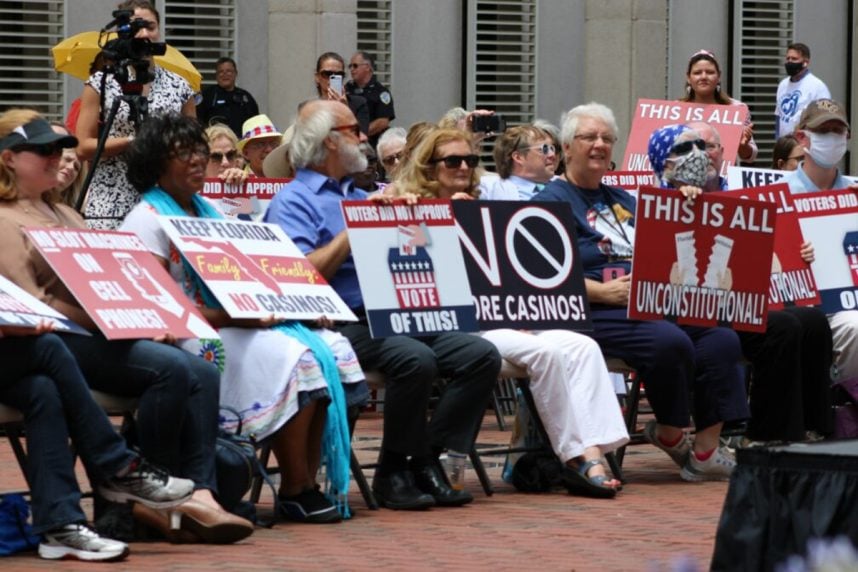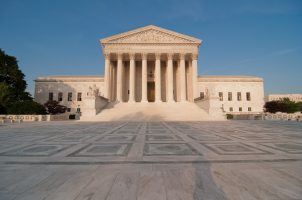Anti-Gambling Group Adds Voice to Florida Sports Betting Case
Posted on: October 17, 2023, 02:33h.
Last updated on: October 18, 2023, 09:37h.
The group behind a Florida constitutional amendment to limit gambling says the state’s sports betting deal with the Seminole tribe violates the will of the voters.

No Casinos, Inc., which has fought gambling expansion for decades, filed a brief in litigation this week before the Florida Supreme Court. It seeks to invalidate the tribal gaming compact that would give the Tribe a monopoly on mobile and retail sportsbooks in the Sunshine State.
The group wrote a constitutional amendment to ban the expansion of casino gambling without explicit approval by voters. In 2018, the group led a successful campaign to get that language added to the Florida constitution, with support from 71% of voters.
Three years later, Gov. Ron DeSantis (R) signed a gaming compact with the Seminole Tribe, allowing it to expand its casino offerings and to begin taking sports bets. The compact would have let the Tribe begin accepting bets online, so long as the sportsbook servers were located on tribal land.
The gaming compact “violates the text, spirit, and public policy” behind that amendment,” No Casinos wrote in its amicus brief in the case. No Casinos is lending its support to opponents led by pari-mutuel operators West Flagler Associates who are asking the Florida Supreme Court to invalidate that compact and implementing laws enacted by the state legislature.
No Casinos’ intervention is the latest move in a years-long fight that has left Florida, one of the largest states in the U.S., without a legal sports betting regime.
Multipronged Legal Fight
Opponents led by pari-mutuel operators West Flagler Associates have spent the intervening years fighting the gaming compact in federal court on the grounds that allowing online betting violates the Indian Gaming Regulatory Act’s prohibition of off-reservation gaming.
The U.S. Supreme Court last week blocked the compact from taking effect while it prepares to consider its opponents’ request to take up the case.
Chief Justice John Roberts placed a stay on an earlier ruling from the U.S. Court of Appeals for the Washington, DC, Circuit, which had declined to rehear the case.
Legal sports betting has been unavailable in Florida since a federal court first blocked the gaming compact in November 2021.
In its brief filed in state court this week, No Casinos points out that federal courts have side-stepped the question of whether the “hub and spoke” model envisioned by the compact is suitable under state law.
Indeed, the DC Circuit explained that state law is critical to the question of whether the parties to the Compact could lawfully ‘deem’ sports betting throughout Florida to be occurring on Indian land,” No Casinos wrote. “Thus, the court explicitly left it to this State’s courts to say what Florida law means, and how that affects the Compact.”
No Casinos says it is up to the state supreme court to declare that the governor and legislature cannot authorize off-reservation gaming of the type the compact would allow.
“The Compact and statutes that perpetuate and endorse the notion that ‘Indian lands’ exist wherever a mobile phone with a gambling app exists is a blatant attempt to legislate in an area that is, in fact, outside the authority of the Governor or the legislature,” No Casinos wrote.
Tribe Sits Out SCOTUS Case
The Seminole Tribe this week told the U.S. Supreme Court that it doesn’t plan to file a response in the case. West Flagler’s suit names the Department of Interior, which oversees Tribal gaming, as the defendant, and the case seeks to invalidate the Interior Secretary’s tacit approval of the underlying Florida compact.
In a letter to the court, the Tribe’s lawyers outlined its previous efforts to intervene on sovereign immunity grounds. It also covered the D.C. Circuit’s denial of those efforts on the grounds that it was upholding the underlying compact.
“For these reasons, the Tribe does not intend to file a response to the stay application,” the letter read. “However, the Tribe would gladly file a response should the Court desire one from the Tribe.”
Related News Articles
Florida Sports Betting Compact Opponents Take Case to US Supreme Court
Supreme Court Blocks Florida Sports Betting Plan Pending Appeal
Florida Sports Betting: Court Denies Redo, Clearing Way To Resume Wagers
Most Popular
Casinos That Were Never Casinos
Most Commented
-
End of the Line for Las Vegas Monorail
— April 5, 2024 — 90 Comments -
Mega Millions Reportedly Mulling Substantial Ticket Price Increase
— April 16, 2024 — 9 Comments -
Long Island Casino Opponents Love New York Licensing Delays
— March 27, 2024 — 5 Comments















No comments yet